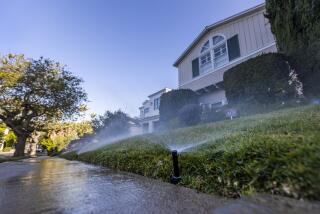Santa Clarita Law Raises Specter of Rationing Despite Ample Water
- Share via
While most of Los Angeles County prepares to enter the war against The Drought, Santa Clarita will join the battle as a volunteer instead of a conscript.
While most communities face mandatory rationing programs, Santa Clarita residents are being asked to voluntarily conserve water as officials tap additional local wells to make up for drastic cuts in state deliveries.
“We’re better off than most of the rest of the state because we have not just one, but two aquifers in the area,” said Dan Masnada, vice president of Valencia Water Co., one of four local purveyors.
The suburban valley is relatively impervious to recent state cutbacks in water deliveries because it relied on local wells to supply about half the 44,000 acre-feet it used last year, Masnada said.
Santa Clarita residents aren’t entirely off the hook.
City officials warn that mandatory rationing might become necessary if residents fail to voluntarily reduce their usage by 25%.
But some people could not resist gloating Wednesday over the area’s relative good fortune.
“I don’t have any friends down in L.A., but if I did I might take pity on them and let them take a shower at my house if they started getting too rank,” said Jack Boyer, a longtime resident who served on the city’s incorporation committee about three years ago.
“I wouldn’t have moved to Los Angeles anyway, but now I’m doubly glad we didn’t,” said Claire Dickinson, who moved to Santa Clarita from Seattle just last month.
The ordinance passed Tuesday by the City Council is intended to reduce water usage by one-fourth by prohibiting practices such as hosing off sidewalks and driveways, and by limiting landscape watering to every other day, some of the same steps Los Angeles took in past years. The ordinance also frees residents from having to comply with landscaping requirements imposed by developers or homeowner associations.
But council members did not set reduction goals for each household and business. Instead, they expressed confidence that residents would conserve water voluntarily and rejected a proposed ban on new pools.
“We should leave it up to the people. If you’d rather water flowers than take a bath, it should be up to you,” Councilwoman Jan Heidt said.
However, to promote compliance, the city will hire a code enforcement officer for about $40,000 per year to enforce the regulations. First-time violators will be warned. A second violation will result in a $50 fine, a third in a $100 fine and subsequent infractions in $300 fines.
The city is trying to get the local water companies to pay for the enforcement officer, but “we’re saying, ‘no way,’ ” said Masnada of the Valencia Water Co.
“Our losses will already be well past $1 million” if people reduce their water usage by 25%, Masnada said.
A drought committee composed of a member of the public, city officials and water company representatives will monitor the effect of the ordinance and recommend rationing if it becomes necessary. The committee will meet twice a month.
Mayor Pro Tem Jill Klajic cast the sole vote against the ordinance, arguing that the city should not give grading permits to developers as long as the five-year, statewide drought continues. The ordinance approved by the council allows developers to do grading only with water unsuitable for drinking.
“I cannot ask my neighbors to restrict the number of times they shower and flush their toilets when we continue to build new showers and toilets,” Klajic said.
Because the ordinance was an emergency measure, a public hearing is scheduled March 13.
More to Read
Sign up for Essential California
The most important California stories and recommendations in your inbox every morning.
You may occasionally receive promotional content from the Los Angeles Times.










